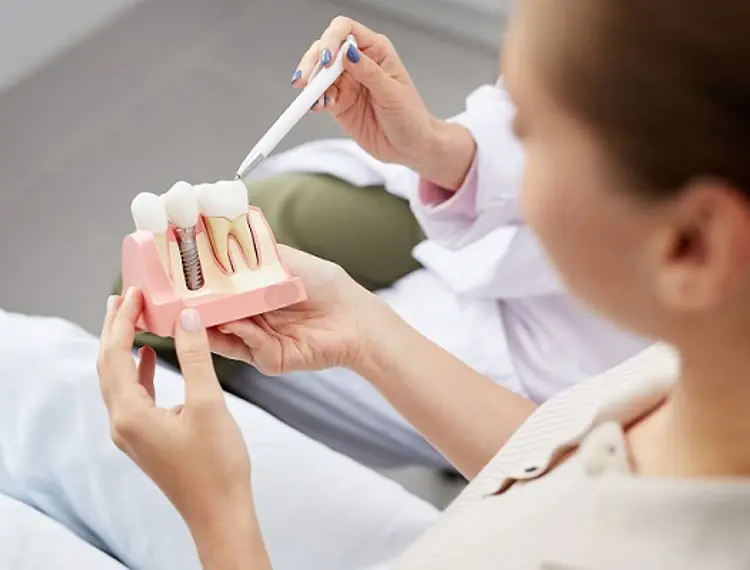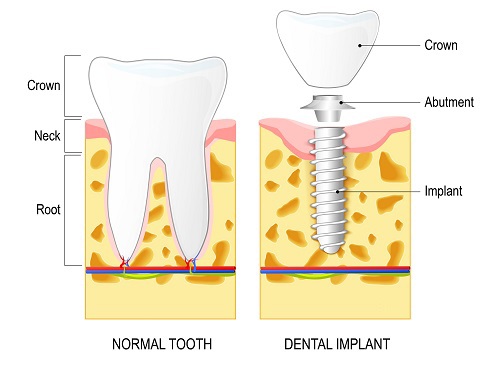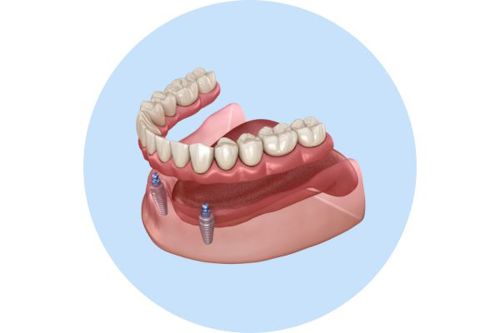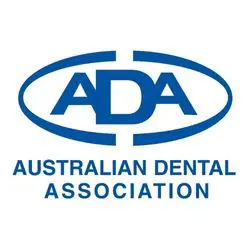
Key messages
- Dental implants are used to replace teeth missing from the mouth.
- Implant treatment may be completed by a general dentist, periodontist, oral surgeon or oral maxillofacial surgeon.
- Not all people are able to get a dental implant.
- Treatment options besides dental implants to replace one or more missing teeth include dentures and dental bridges.
Dental implants are used to replace teeth missing from the mouth. Implants treatment may be completed by a general dentist, periodontist, oral surgeon or oral maxillofacial surgeon.
What is a dental implant?
A dental implant can be thought of as a fake tooth root that looks like a metal screw. The implant is put into the jawbone where the tooth was originally located. The jawbone grows around the implant screw to hold the screw securely in place. This takes approximately three months.
A fake tooth, called an implant crown, is attached to the dental implant screw. The implant crown fills the space inside the mouth left by the missing tooth. The implant crown is made to match the appearance of the teeth around it. This treatment is usually done three months after the screw is placed so that it has time to heal.
Dental implants are used to replace one or more missing teeth inside the mouth.

Can dental implants replace multiple teeth?
Yes, dental implants can replace multiple teeth at once. This is done using an implant bridge or a denture held in place by implants.
Dental implants can replace more than one tooth at a time. This is done using a bridge where two or more implant screws are placed into the bone. The implants are joined together by an artificial bridge made of crowns that are stuck together side-by-side.

A breakdown of the parts of an implant bridge.
A full denture, which replaces all the teeth in one jaw, can be held in place by dental implants. This is called an "implant-supported denture".

Advantages of dental implants
There are some advantages of having dental implants replace missing teeth in your mouth.
- They look and feel like your own teeth.
- They are cared for in a similar way to natural teeth.
- Treatment does not involve or affect the teeth next door to the dental implant. This is a benefit when those teeth have not been affected by dental treatments in the past.
Am I eligible for a dental implant?
Not all people are able to get a dental implant. Your dentist will assess whether this treatment is right for you. One of the most important factors is if there is enough bone present to hold an implant in place. Dental x-rays will be taken to help your dentist or dental specialist to assess this. This will commonly include a 3D x-ray.
Some medical conditions and medications can impact if you are suitable for a dental implant. Therefore it is important to let your dentist know your full medical history including any vitamins and supplements bought from pharmacies and supermarkets. You may not be a good candidate for a dental implant if you have severe gum disease, called periodontitis, or smoke cigarettes.
If you are interested in dental implant treatment, talk to your dentist about whether this treatment is right for you.
Options to replace teeth besides dental implants
Dental implants are used to replace missing teeth. Other treatment options to replace one or more missing teeth include dentures and dental bridges. Each treatment has advantages and disadvantages and your dentist can discuss these with you to help you to make the choice that is right for you.
How to look after your dental implant
It is important to care for your dental implants just like your natural teeth. Dental implants cannot develop tooth decay but they can be affected by gum disease just like natural teeth. Inflammation of the gums and bone loss around a dental implant is called peri-implantitis. It is important to have this condition treated. If it is not treated, it can cause the implant to become loose and even fail.
Look after your implant just like your other teeth.
Brush twice every day. Be sure to brush down to your gums so that your brush cleans the areas where your implant and gums meet.
Clean between your implant and the teeth beside the implant every day. This can be done with floss, interdental brushes, or a water flosser. Your treating dentist or dental specialist will show you the best way to care for your implant. The method can change if you have one implant compared to an implant bridge.
Attend for regular checkups and professional dental cleans with your dentist, dental hygienist or oral health therapist who will help you to care for your implant.


